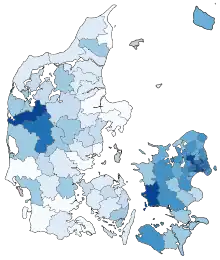COVID-19 pandemic in Denmark
The ongoing COVID-19 pandemic was first confirmed to have spread to Denmark on 27 February 2020. As of 13 May 2020, there have been 10,667 confirmed cases.[5][note 1] Among these, 533 patients have died,[note 3] 8,663 have recovered, and 164 are in hospital, including 37 in intensive care.[5]
| COVID-19 pandemic in Denmark | |
|---|---|
 Number of confirmed cases by municipality (as of 27 April): 0 confirmed 1–19 confirmed 20–39 confirmed 40–59 confirmed 60-99 confirmed 100+ confirmed | |
| Disease | COVID-19 |
| Virus strain | SARS-CoV-2 |
| Location | Denmark |
| First outbreak | Wuhan, China (globally), Lombardy, Italy (origin of first Danish case), Tyrol, Austria (origin of most imported cases)[1] |
| Index case | Roskilde |
| Arrival date | 27 February 2020 (4 years, 2 months, 3 weeks and 2 days) |
| Confirmed cases | 10,667[2][note 1] |
| Active cases | 1,471[note 2] |
| Severe cases | 37 (number of cases in ICU)[5] |
| Recovered | 8,663[2] |
Deaths | 533[2][note 3] |
Lockdown effect
Denmark was among the first European countries to introduce lockdown measures, starting on 13 March. Following a period of increase in hospitalizations, the number of people in hospital with COVID-19 has been falling since late March, with the number of cases in need of intensive care and ventilator[5] being well below available resources.[6] Starting on 15 April, a very slow and gradual reopening has been initiated, but if there are indications that the number of infections increases too fast, it will be reversed.[7]
Greenland
The pandemic was confirmed to have spread to Greenland in March 2020. There have been 11 confirmed cases, but none in need of hospitalization. The last infected person had recovered on 8 April and there are no known active cases in Greenland.[8]
Economic response
In an attempt to reduce the economic impact of the pandemic, the government created a large economic packages with the support of all parties in Parliament.[9] Nevertheless, it was expected that the decrease in GDP would be between 3 and 10% in 2020.[10]
Notes
- From 12 March to 1 April, only people with more serious symptoms, vulnerable people and health professionals were tested. From 1 April, testing was again performed more broadly.[3] The actual number of cases is presumed to be significantly higher than the confirmed infections.[4]
- Confirmed cases, minus recovered and deaths
- All people confirmed to have had COVID-19 within 30 days of death are counted, whether or not it is known to have been the cause of their demise[2]
References
- "Statens Serum Institut: 139 danskere på skiferie i Østrig bragte virus med hjem". TV 2 (in Danish). 12 March 2020. Retrieved 1 April 2020.
- "Udbrud med ny coronavirus COVID-19" (in Danish). Retrieved 13 May 2020.
- "Retningslinjer for håndtering af COVID-19 i sundhedsvæsenet" (in Danish). Sundhedsstyrelsen (Danish Health Authority). 1 April 2020. Archived from the original on 12 April 2020. Retrieved 6 April 2020.
- Hagemann-Nielsen, Frederik (2 April 2020). "123 personer smittet med coronavirus er nu døde - over 1.000 er kommet sig". DR (in Danish). Retrieved 6 April 2020.
- "Følg smittespredningen globalt, regionalt og lokalt" (in Danish). Archived from the original on 20 March 2020. Retrieved 13 May 2020.
- "Håndtering af COVID-19: Prognose og kapacitet i Danmark for intensiv terapi". Sundhedsstyrelsen (Danish Health Authority) (in Danish). 22 February 2020. Retrieved 6 April 2020.
- Nielsen, Nicolas S.; Eller, Emil Christian (6 April 2020). "Regeringen åbner vuggestuer, børnehaver og skolen for de mindste børn i næste uge". DR (in Danish). Retrieved 6 April 2020.
- "Coronavirus-ip nutaap siaruarnera malinnaaffigiuk" (in Danish and Kalaallisut). Archived from the original on 10 January 2021. Retrieved 8 April 2020.
- Kauffmann, Julie (19 March 2020). "Hjælpepakke er klar, men flere kan være på vej: "Vi vil gøre, hvad der end skal til for at få Danmark igennem den her svære tid"". Politiken (in Danish). Retrieved 6 April 2020.
- Hald, Michelle (1 April 2020). "Coronakrisen er hård ved økonomien: Nationalbanken forudser, at økonomien skrumper op til ti procent". DR (in Danish). Retrieved 6 April 2020.